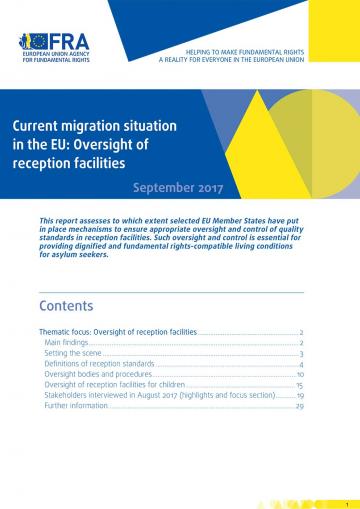This report covers:
- Definitions of reception standards
- Oversight bodies and procedures
- Oversight of reception facilities for children
- Further information
Main findings
- All of the fourteen EU Member States consulted report significant challenges with respect to the conditions in reception facilities.
- Although stakeholders interviewed in most EU Member States report that challenges outweigh positive developments in reception facilities, all (except Italy, Greece and Poland) also identified good practice examples.
- With the exception of Bulgaria and Greece, all EU Member States covered have implemented some kind of written standards for reception conditions. Seven EU Member States (Denmark, Finland, France, Hungary, The Netherlands, Poland and Slovakia) provide for legally binding standards, while in Germany such standards exist in some federal states. In Austria, Spain and Sweden, the laws set general standards and non-binding guidance describes the details. Italy has different types of standards for different reception facilities.
- The standards are available in the public domain in at least eight EU Member States (Austria, Denmark, Finland, France, Hungary, Poland, Spain and Sweden) and in Germany in some federal states.
- Almost half of the consulted EU Member States (Austria, Denmark, Finland, France, in some parts of Germany and Sweden) define the standards for reception facilities in the contracts with reception facilities operators.
- With the exception of Italy, Greece and Hungary, all selected EU Member States (Austria, Bulgaria, Denmark, Finland, France and in some parts of Germany, Slovakia and Sweden) have designated bodies responsible for oversight of reception conditions in place. In Italy, oversight is project-based.
- Independence of oversight bodies is a key element for effective control mechanisms. Oversight bodies are independent in at least three EU Member States (Austria, Bulgaria and The Netherlands).
- In the majority of EU Member States, oversight bodies inspect asylum facilities on a regular basis (with the exception of Greece and Hungary). In at least five EU Member States, the oversight bodies undertake unannounced as well as announced inspections (Austria, Denmark, Finland, Germany and The Netherlands). In France, inspections are unannounced, while in Bulgaria, Slovakia and Sweden, oversight bodies announce their inspections.
- Asylum seekers can lodge a complaint against the conditions of reception facilities in the majority of EU Member States (all consulted EU Member States with the exception of France, Greece and Italy). However, where data were available, the number of such complaints is very low.
Note on geographical coverage:
This report describes existing standards for oversight of reception facilities as outlined in law and through other means in fourteen Member States. Information was gathered through desk research and interviews with different national stakeholders, such as migration authorities, civil society organisations, ombudspersons, the police and UNHCR in Austria, Bulgaria, Denmark, Finland, France, Germany, Greece, Hungary, Italy, the Netherlands, Poland, Slovakia, Spain and Sweden.
For Germany and Austria, given their federal structure, the information does not apply to the whole territory, pertaining only to select regions or localities.
